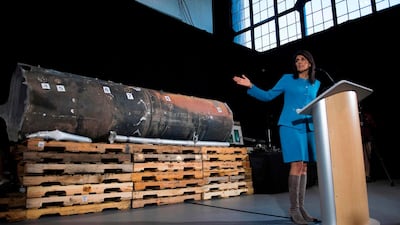Repeated Houthi missile attacks on Saudi Arabia show that Iran is trying to prevent a political resolution to Yemen's war, the United States said, as the rebels launched another strike on the kingdom's south on Saturday.
The White House said the attacks "call into question the Houthis' commitment to a peace process".
They also "demonstrate that Iran's Islamic Revolutionary Guard Corps is continuing to disrupt a nascent political process, escalate hostilities, and destabilise the region by proliferating weapons to the Houthis and others", it said in a statement released in Friday.
The Houthi missile launched on Saturday was targeted at the city of Najran, said Col Turki Al Malki, spokesman for the Saudi-led military coalition supporting Yemen's government.
"It was successfully intercepted and the debris fell on residential areas, lightly wounding one Indian expatriate," Col Al Malki said.
The Houthi-run Saba news agency said earlier that a ballistic missile was fired at a Saudi National Guard base in the city.
Saudi forces last Sunday intercepted seven Houthi missiles launched toward Saudi cities, including Riyadh, killing one person. Another missile fired at Jazan on Thursday was also brought down, Col Al Malki said.
The coalition said forensic examination of the wreckage showed that the missiles fired on Sunday were supplied by Iran.
Iran denies arming the Houthis but separate investigations by the UN, the US and a weapons-tracking group have all found evidence that weapons and explosives used by the rebels were supplied by Tehran.
The UN Security Council on Wednesday condemned the rebels' missile attacks on Saudi Arabia "in the strongest possible terms", saying they posed a threat to regional security.
Council members “expressed alarm at the stated intention of the Houthis to continue these attacks against Saudi Arabia, as well as to launch additional attacks against other states in the region”.
The council called for dialogue to reach a political settlement that would end the war in Yemen, now in its fourth year.
The UN special envoy for Yemen held talks with the Houthis in Sanaa last week during his first visit to the rebel-held capital since talking up the post on March 19.
Martin Griffiths, a former British diplomat who took over from Ismail Ould Cheikh Ahmed, earlier held talks with Yemeni President Abdrabu Mansur Hadi and his ministers in Riyadh.
______________
Read more:
UN Security Council condemns Houthi missile attacks on Saudi Arabia
Iran provides Yemen’s Houthis material for explosives, report says

